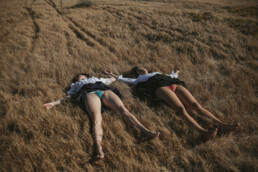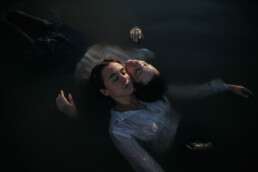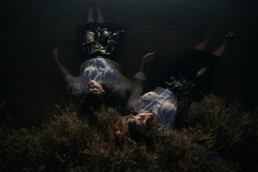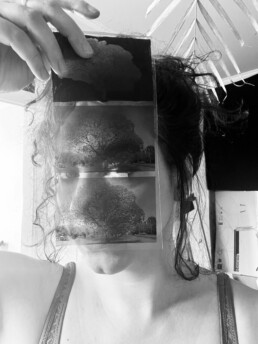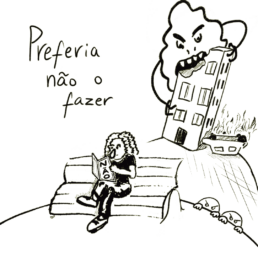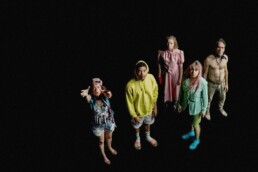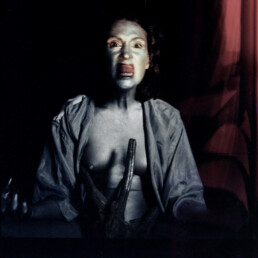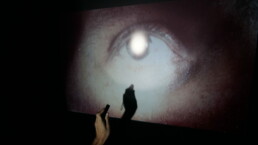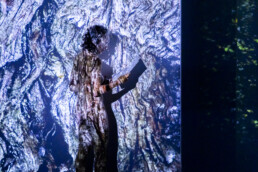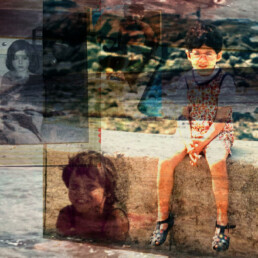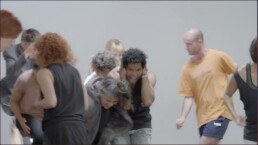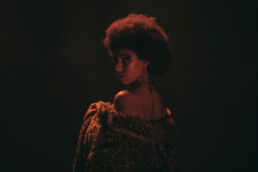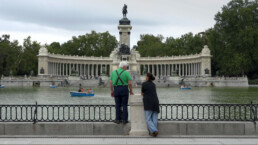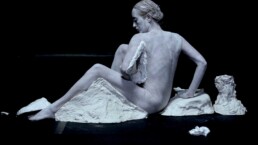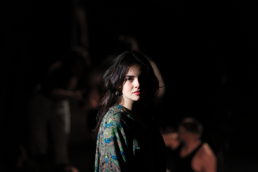NÓS SOMOS AS NETAS DE TODAS BRUXAS QUE VOCÊS NÃO CONSEGUIRAM QUEIMAR
Bestiário
A multidão reúne-se para o evento habitual. A figura é arrastada e a massa, em êxtase, vocifera injúrias, arremessa objectos e, em catarse, expurga a sua ira. O carrasco cumpre a sua função, o corpo incendeia-se, afoga-se, enforca-se, envenena-se e a plateia está em ovação. A última mulher a ser sentenciada por bruxaria na Europa morreu em 1782, na Suíça.
Quarenta a cinquenta mil mulheres foram mortas durante o período da caça às bruxas. As mais fustigadas eram, por um lado, idosas ou viúvas que, sem recursos, recorriam à mendicidade, e, por outro, mulheres que tinham conhecimentos audazes para a condição feminina, como ervas contraceptivas e abortivas, bem como, camponesas que lutavam pelo direito à sua terra. Estas mulheres, que diferiam do padrão de feminilidade vigente, eram uma ameaça ao poder e tinham que ser aniquiladas.
Bio
Teresa V. Vaz (Lisboa, 1988) . Mestre em gestão cultural pela Universidade Politécnica de Valência (Espanha). É licenciada pela Escola Superior de Teatro e Cinema – ramo actores. Entre 2010 e 2012 esteve em Valência a integrar o projecto profissional Estudio del Arte para el Actor no Laboratorio de Arte en Vivo com Dario Valtancoli. Entre 2014 e 2015, como actriz, dramaturga e encenadora desenvolveu o projecto Amor, Desamor, Amor: contado em pequenas histórias de solidão, apresentado em diversos espaços não convencionais da cidade de Lisboa. Desde 2018 é co-fundadora, juntamente com Afonso Viriato, Helena Caldeira e Miguel Ponte da estrutura artística Bestiário onde encenou Atmavictu (2018), Homem-agem (2020), Galeria (2021) e Homo Sacer (2023) em co-produção com o TNDM II, co-dirigiu Parlamento Shakespeare (2019) e Parlamento Grimm (2020). Enquanto criadora e intérprete entrou em Umbra (2019), Lumina (2022) e Mesa (2022). Atmavictu, a sua segunda encenação, foi distinguida pelo Blog Comunidade Cultura e Arte como um dos “15 momentos memoráveis de Teatro em Lisboa em 2018” e as “20 melhores peças de teatro de 2018 em Portugal”.
Bestiário
Nasce de fragmentos, por isso tem nome de colecção. Cada fragmento tem uma história, e é na justaposição das várias narrativas que criamos uma identidade. Procuramos investigar a nossa herança cultural reavivando as histórias biográficas e populares.
Posicionamo-nos no presente, escolhendo ora vivê-lo, ora analisá-lo. Queremos fomentar a criação de autor, deixando-nos inspirar pelas ciências naturais e sociais. Acreditamos em obras de arte que contaminem.
A Bestiário nasceu em 2018 pelas mãos de Afonso Viriato, Helena Caldeira, Miguel Ponte e Teresa V. Vaz.
Ficha Técnica
conceito, direcção artística e dramaturgia
Teresa V. Vaz
textos
a partir de O Apocalipse de São João, Malleus Maleficarum de Heinrich Kramer e James Sprenger e Feiticeiros, profetas e visionários. Textos antigos Portugueses seleção de Yvonne Cunha Rêgo
criação e interpretação
António Bollaño, Francisca Neves, Joana Petiz, Lia Vohlgemuth
dispositivo cénico e figurinos
Teresa V. Vaz
apoio de figurinos e bordados
Isabel Brissos
instalação sonora
Filipe Baptista
apoio à instalação plástica
Daniela Cardante
curadoria e assessoria teórica
Vânia Moreira
direcção de produção
Manuela Morais
apoio à produção e à direção artística
Bestiário
assessoria de comunicação
Helena Marteleira
vídeo
DROID.ID
fotografia
Bruno Simão
co-produção
Teatro Cine Gouveia, Teatro José Lúcio da Silva
residências
A Oficina – Teatro Oficina Guimarães
apoios financeiros
Câmara Municipal de Lisboa, República Portuguesa Cultura / Direção-Geral das Artes
apoios
Festival Temps d’Images, Pólo Cultural das Gaivotas, Espaço Lx Jovem
media partners
Coffeepaste, Gerador
agradecimentos
Afonso Viriato, David Erlich, Carolina Franco, Carolina Serrão, Cátia Faísco, Helena Caldeira, Miguel Ponte, Nicola Pittau
NÓS SOMOS AS NETAS DE TODAS BRUXAS QUE VOCÊS NÃO CONSEGUIRAM QUEIMAR
Bestiário
The crowd gathers for the usual event. The figure is dragged away and the ecstatic masses hurl insults, throw objects and, in catharsis, vent their anger. The executioner does his job, the body catches fire, drowns, hangs itself, poisons itself and the audience cheers. The last woman to be sentenced for witchcraft in Europe died in 1782 in Switzerland.
Forty to fifty thousand women were killed during the witch-hunt period. Those most affected were, on the one hand, old women or widows who, without resources, resorted to begging, and, on the other, women who had daring knowledge of the female condition, such as contraceptive and abortifacient herbs, as well as peasants who were fighting for the right to their land. These women, who differed from the prevailing standard of femininity, were a threat to power and had to be annihilated.
Teresa V. Vaz
Lisbon, 1988. She has a master’s degree in cultural management from the Polytechnic University of Valencia (Spain). She has a degree from the Escola Superior de Teatro e Cinema – actors branch. Between 2010 and 2012 she was in Valencia as part of the professional project Estudio del Arte para el Actor at the Laboratorio de Arte en Vivo with Dario Valtancoli. Between 2014 and 2015, as an actress, playwright and director, she developed the project Amor, Desamor, Amor: told in short stories of loneliness, presented in various unconventional spaces in the city of Lisbon. Since 2018 she has co-founded the artistic structure Bestiário with Afonso Viriato, Helena Caldeira and Miguel Ponte, where she has staged Atmavictu (2018), Homem- agem (2020), Galeria (2021) and Homo Sacer (2023) in co-production with TNDM II, and co- directed Parlamento Shakespeare (2019) and Parlamento Grimm (2020). As a creator and performer, she appeared in Umbra (2019), Lumina (2022) and Mesa (2022). Atmavictu, her second staging, was distinguished by the Comunidade Cultura e Arte blog as one of the “15 memorable moments of Theater in Lisbon in 2018” and the “20 best plays of 2018 in Portugal”.
Bestiário
Bestiário is born from fragments, which is why it has the name of a collection. Each fragment has a story, and it is in the juxtaposition of the various narratives that we create an identity. We seek to investigate our cultural heritage by reviving biographical and popular stories.
We position ourselves in the present, choosing either to live it or to analyze it. We want to encourage the creation of authors, letting ourselves be inspired by the natural and social sciences. We believe in works of art that contaminate.
Bestiário was born in 2018 by Afonso Viriato, Helena Caldeira, Miguel Ponte and Teresa V. Vaz.
Credits
concept, artistic direction and dramaturgy Teresa V. Vaz
texts from The Apocalypse of St. John, Malleus Maleficarum by Heinrich Kramer and James Sprenger and Sorcerers, prophets and visionaries. Ancient Portuguese texts selected by Yvonne Cunha Rêgo
creation and interpretation António Bollaño, Francisca Neves, Joana Petiz, Lia Vohlgemuth
scenic and costume design Teresa V. Vaz
costume and embroidery support Isabel Brissos
sound installation Filipe Baptista
plastic installation support Daniela Cardante
curator and theoretical advisor Vânia Moreira
production direction Manuela Morais
production and artistic direction support Bestiário
press Helena Marteleira
video DROID.ID
photography Bruno Simão
co-production Teatro Cine Gouveia, Teatro José Lúcio da Silva
residencies A Oficina – Teatro Oficina Guimarães
funding Lisbon City Council, Portuguese Republic Culture / Directorate-General for the Arts
support Festival Temps d’Images, Pólo Cultural das Gaivotas, Espaço Lx Jovem
media partners Coffeepaste, Gerador
acknowledgements Afonso Viriato, David Erlich, Carolina Franco, Carolina Serrão, Cátia Faísco, Helena Caldeira, Miguel Ponte, Nicola Pittau
